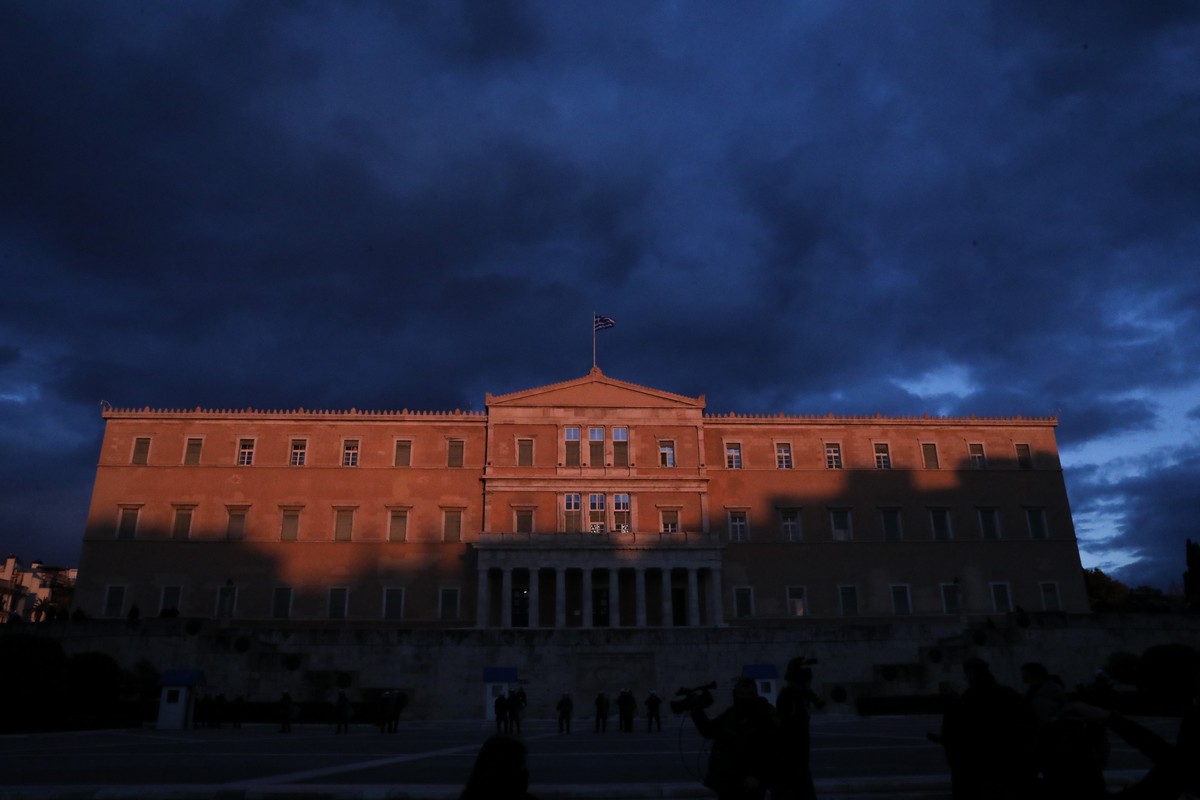
We have long insisted that the decade 2010-2020 marks the era of the final end of late post-colonialism. And this is because its two pillars, parasitic consumerism and pacifist nihilistic racist fantasies, have gone into crisis, one after another.
It will be preceded by the violent destruction of the parasitic form with its embryo Schäublewhich led to an unprecedented economic and social catastrophe after the Civil War (a 25% contraction in GDP and a 35% decrease in disposable income due to higher taxes to pay off debts).
Then, with the price of the weakening of Greece and the collapse of armaments expenditures, as well as the parallel rapid development of Turkey, came Erdogan To complete the work of the Teutonic Surgeon, demanding the complete and final submission of Greece and Cyprus to the new Ottoman Turkey.
Thus, my postcolonial condition/pillars entered into crisis. Yet, because Greece was a parasitic, aging, and decadent society, and parasitic ethnocentrism and consumerism had permeated the very core of the national body, the decay of the old was slow and painful. So, the parasitic post-colonial revolutions from ANEL, Golden Dawn, Potami and Varoufakis to SYRIZA (the reference here is not of an evaluative nature, i.e. we do not identify disparate forces) emerged temporally to represent the ‘new’ and ‘response’ to the crisis.
Finally, after the year 2019 which constitutes an important turning point in the course of disintegration and reconfiguration, in a paradoxical way, but perfectly understandable, the process of political reconfiguration will be launched by the right and the center right. This faction, by tradition, transcends the post-colonial stage, and because of its social composition, the traditional homeowners on the one hand, linked to national values, the technocratic market executives and the newer liberals, manage to avoid collapse and respond primitively to the demands. new period.
Because these two wings were not fully unified, as the response to the economic crisis of the post-revolutionary model was given priority, the initiative to rebuild the party to seize power would be taken by “racially indifferent” technocrats. Under the leadership of Kyriakos Mitsotakis.
Mitsotakis will try to renew at the government level, creating a summit alliance with part of the anti-Semitic PASOK and Potamios, in order to overcome the entanglement and delay of traditional new democracy.
It is clear that under normal political circumstances, this injection of modernization from above into the new democracy would meet with great resistance, especially from the traditional party establishment. However, in a paradoxical way, the Mitsotakis government has been favored, to its misfortune, by the successive crises it has faced – especially the one with Turkey, but also the coronavirus crisis.
In the conditions of growing opposition from Europe, at least from France, but also from the United States and Israel to Erdogan’s pro-Russian, pro-Islamic policy, the crisis with Turkey forced Mitsotakis and at the same time allowed Mitsotakis to act “patriotically”. In doing so she assuaged any objections of the patriotic wing, Samaritan or not.
At the same time, the pandemic crisis, as well as the economic crisis caused by the Russian invasion of Ukraine, forced the government to work in a socio-democratic and not at all liberal way. After all, neoliberalism and globalization have suffered a more general defeat on a global scale.
In this regard, the “neoliberal benefactors” were forced to become small and universal socialist “rivers” to realize the need for deterrence and arming. Thus New Democracy, an old heavy party, willingly or not, first entered the post-politics era. It is no coincidence, after all, that the postcolonial was left-handed. And that is why those forces that remain utterly bound to the post-political paradise and the ideologies of ethnocentrism and parasitic consumerism are the forces of the left. These will claim for example admission to universities without any grade restrictions, will refuse equipment and will still be Russophiles in their majority.
That is, something is happening completely unlike what happened during the post-colonial period, when the winds of change came from the left, while the right was the last to join the post-colonial ideologies – good and evil. That is why it was also the first to finally enter the post-colonial period!
Yet the premiership group’s obsession with theoretical and historical ethnic deconstruction, which runs counter to its own practice – the practice of deterrence – remains important and troubling. And because the conflict with Turkey is long-term, as long as the practice of deterrence is not accompanied by a visionary background and a reflection of nihilistic ethnic delusions, it will necessarily remain incomplete and fraught with dangers. Subtlety exacerbated by the lack of an interlocutor/antagonist articulating the relevant ideological and political issues more clearly.
In opposition, the only possibilities for overcoming post-political ideology should, in theory, exist in the center-left space, once covered by the PASOK movement. Theoretically, since the forces that claimed to synthesize nationalism and socialism in the early post-colonial period were concentrated here, some similar forces could and should emerge here. And certainly there are still some in the center-left popular body.
However, since many years of rule and decades of abandonment of patriotism have passed, from Simitis to GAP, the machinery of this party and its executives – from Laliotis and Skandalidis to Geroneos Androulakis – prevent any development. PASOK will ultimately remain the post-colonial party par excellence and will want to die with it.
Only the dissolution of the PASOK mechanism, which is very likely after the next elections, can allow any development in this key area. Meanwhile, the Venizelos patriots will be forced to follow the new republic of Kyriakos Mitsotakis, as well as a group of his younger cadres – see Schertso, Pierrakaki et al.
Because the left as a whole seems entrenched in a parasitic and ethnically destructive logic, at least for the time being, it is the last political force that seems willing to accept a transition into a new era, where patriotism, productive reconstruction, defense of borders, and obsession with patriotism are the main ones. Demographic recovery and reconnection with the great cultural traditions of Hellenism will come to the fore.
On the contrary, they are still bound by the ideological ashes of the late postcolonialism of the Right and their anti-nationalism, to which they have joined body and soul. After all, the same thing is happening in most of Europe: the left now represents the most reactionary and conservative part of society, if by these terms we mean those who are still attached to the values of an outdated era.
Consequently, the transition to the new historical period, in which salus patriae suprema lex esto will appear as the central demand of Greek society, is taking place very slowly and with innumerable delays and distortions, since Greek society is extremely archaic and parasitic.
This is done through the slow transformation of the old parties. Because the crisis of memorandum, as already mentioned, did not produce anything fundamentally new, but was mainly generated by forces directed towards the post-political paradigm.

“Avid problem solver. Extreme social media junkie. Beer buff. Coffee guru. Internet geek. Travel ninja.”





More Stories
The European Union's “strike” on fast fashion giant Shein
The family owned huge wealth without knowing it
Financial Times: A Greek economic miracle with the country…the poorest in Europe